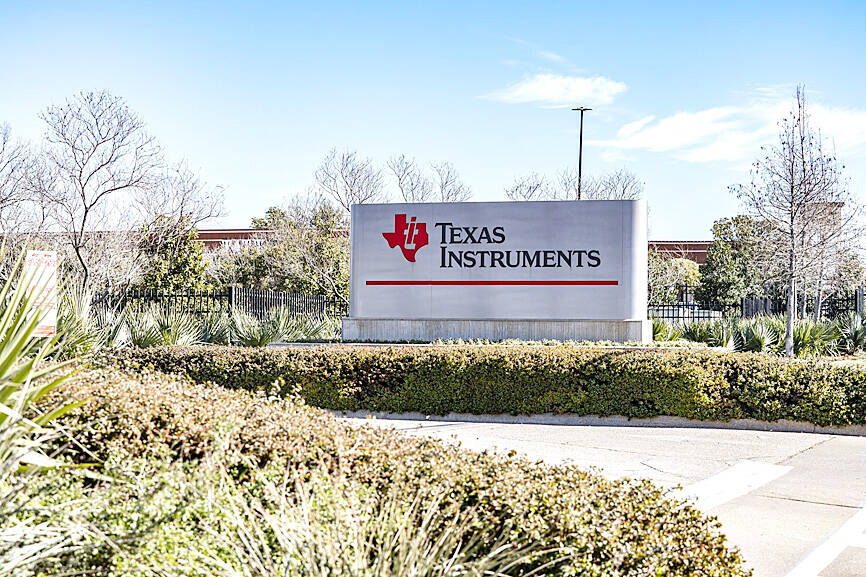Texas Instruments Inc’s shares declined the most in nearly five years on Friday after the chipmaker gave a disappointing earnings forecast for the current period, hurt by still-sluggish demand and higher manufacturing costs.
Profit will be US$0.94 to US$1.16 a share in the first quarter, the company said in a statement on Thursday. The midpoint of that range, US$1.05 a share, was well below the US$1.17 that analysts projected on average.
Much of the electronics industry remains mired in a slump — contributing to nine consecutive quarters of sales declines at the company.

Photo: Bloomberg
Manufacturing expenses also have affected profit, Texas Instruments executives said.
Texas Instruments gets the biggest portion of its sales from manufacturers of industrial equipment and vehicles, making its projections a bellwether for much of the global economy.
Three months ago, executives said some of the company’s end markets were showing signs of emerging from an inventory glut, but the rebound has not come as quickly as some investors anticipated.
The company’s shares fell 7.5 percent to US$185.52 in New York on Friday. That wiped out the stock’s entire gain this year and marked the worst single-day rout since the early days of the COVID-19 pandemic in March 2020.
Texas Instruments CEO Haviv Ilan on a conference call with analysts on Thursday said that industrial demand remains slow.
“Industrial automation and energy infrastructure still haven’t found the bottom,” he said.
In the automotive segment, growth in China was not as strong as it has been, meaning it cannot offset the expected weakness in other parts of the world.
“We haven’t seen the bottom yet — let me be clear,” Ilan said, although the company is seeing “points of strength.”
Sales would be US$3.74 billion to US$4.06 billion in the first quarter, Texas Instruments said, compared with an estimate of US$3.86 billion.
In contrast with the disappointing forecast, December quarter results handily beat analysts’ estimates. Although sales fell 1.7 percent to US$4.01 billion, analysts had projected US$3.86 billion. Profit was US$1.30 a share, compared with a prediction of US$1.21 per share.
Texas Instruments is the biggest maker of chips that perform simple but vital functions in a broad range of electronic devices. It is also the first large US chipmaker to report numbers in the current earnings season.
Chipmakers in other parts of the world have offered a mixed picture of demand for their products. Taiwan Semiconductor Manufacturing Co (台積電), Samsung Electronics Co and SK Hynix Inc have pointed to continuing strength in data center products — helped by the artificial intelligence boom. However, overall growth is still hampered by downturns in other markets, such as smartphones and personal computers.

Taiwan Semiconductor Manufacturing Co (TSMC, 台積電) last week recorded an increase in the number of shareholders to the highest in almost eight months, despite its share price falling 3.38 percent from the previous week, Taiwan Stock Exchange data released on Saturday showed. As of Friday, TSMC had 1.88 million shareholders, the most since the week of April 25 and an increase of 31,870 from the previous week, the data showed. The number of shareholders jumped despite a drop of NT$50 (US$1.59), or 3.38 percent, in TSMC’s share price from a week earlier to NT$1,430, as investors took profits from their earlier gains

In a high-security Shenzhen laboratory, Chinese scientists have built what Washington has spent years trying to prevent: a prototype of a machine capable of producing the cutting-edge semiconductor chips that power artificial intelligence (AI), smartphones and weapons central to Western military dominance, Reuters has learned. Completed early this year and undergoing testing, the prototype fills nearly an entire factory floor. It was built by a team of former engineers from Dutch semiconductor giant ASML who reverse-engineered the company’s extreme ultraviolet lithography (EUV) machines, according to two people with knowledge of the project. EUV machines sit at the heart of a technological Cold

Taiwan’s long-term economic competitiveness will hinge not only on national champions like Taiwan Semiconductor Manufacturing Co. (TSMC, 台積電) but also on the widespread adoption of artificial intelligence (AI) and other emerging technologies, a US-based scholar has said. At a lecture in Taipei on Tuesday, Jeffrey Ding, assistant professor of political science at the George Washington University and author of "Technology and the Rise of Great Powers," argued that historical experience shows that general-purpose technologies (GPTs) — such as electricity, computers and now AI — shape long-term economic advantages through their diffusion across the broader economy. "What really matters is not who pioneers

TAIWAN VALUE CHAIN: Foxtron is to fully own Luxgen following the transaction and it plans to launch a new electric model, the Foxtron Bria, in Taiwan next year Yulon Motor Co (裕隆汽車) yesterday said that its board of directors approved the disposal of its electric vehicle (EV) unit, Luxgen Motor Co (納智捷汽車), to Foxtron Vehicle Technologies Co (鴻華先進) for NT$787.6 million (US$24.98 million). Foxtron, a half-half joint venture between Yulon affiliate Hua-Chuang Automobile Information Technical Center Co (華創車電) and Hon Hai Precision Industry Co (鴻海精密), expects to wrap up the deal in the first quarter of next year. Foxtron would fully own Luxgen following the transaction, including five car distributing companies, outlets and all employees. The deal is subject to the approval of the Fair Trade Commission, Foxtron said. “Foxtron will be